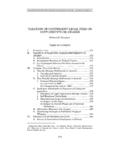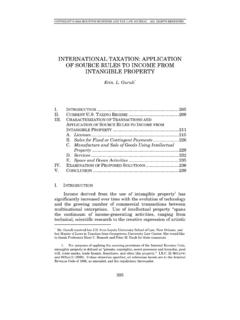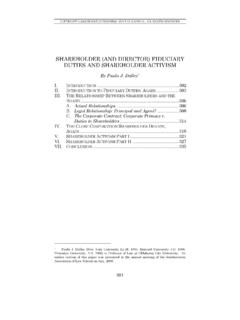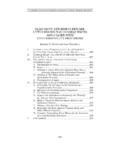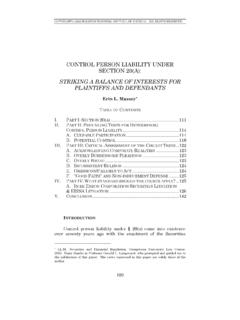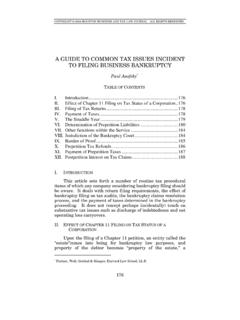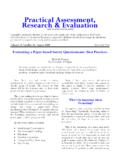Transcription of EVOLUTION OF THE FBAR - We mean Business and …
1 COPYRIGHT 2006 HOUSTON Business AND TAX JOURNAL. ALL RIGHTS RESERVED 1 EVOLUTION OF THE fbar : WHERE WE WERE, WHERE WE ARE, AND WHY IT MATTERS By Hale E. Sheppard* I. II. OVERVIEW OF THE A. Description of the Relevant B. Description of the fbar Form and the Instructions 1. Who Must File an fbar ? ..5 2. What Do the Terms-of-Art Mean?..6 3. Are There Any Exceptions to the fbar Filing Requirement? ..8 (a) Commercial Bank (b) Publicly-Traded Domestic Corporation (c) Military Banking Facility Exception ..9 (d) Branch of Foreign Bank (e) Consolidated Reporting (f) Limited Control Exception ..10 III. WHERE WE A. Civil Penalties Under the Old B.
2 How Effective Was the Old Law?..12 1. First Report to 2. Second Report to Congress ..15 3. Third Report to Congress ..16IV. WHERE WE A. Civil Penalties Under the New B. Unresolved Issues Regarding the 1. Who is Subject to the fbar Filing Requirements?..19 2. Will Normal IRS Procedures and Taxpayer Protections Apply? ..22 3. Will the IRS Exercise Discretion? ..23 4. Many People Are Unaware of the fbar Filing Requirement, but Can They Prove It? ..25 5. Is It Possible to Meet the Reasonable Cause Exception? ..31 COPYRIGHT 2006 HOUSTON Business AND TAX JOURNAL. ALL RIGHTS RESERVED 2 HOUSTON Business AND TAX LAW JOURNAL [Vol. VII (a) First (b) Second Condition.]
3 33 i. Rationale for the Reasonable Cause ii. Meanings of Particular Terms ..35 6. When Does the Violation Occur? ..38V. WHY IT I. INTRODUCTION Many people have financial accounts in foreign countries, but few of them are admitting it. This indisputable fact has miffed the government in general, and the Internal Revenue Service ( IRS ) in particular, for more than three decades. In an attempt to resolve the problem, Congress passed legislation decades ago requiring certain taxpayers to report their foreign accounts by filing a Form TD F (Report of Foreign Bank and Financial Accounts) each year. In tax circles, this form is commonly known as the Foreign Bank Account Report or fbar .
4 In addition to mandating the filing of annual FBARs, the legislation forced taxpayers to retain detailed records about their foreign accounts. Failure to comply with either of these requirements could lead to civil and criminal penalties. Despite these potential sanctions, fbar compliance has remained relatively low for years. Things are likely to change in the near future, though, for a variety of reasons. Importantly, Congress amended the law in late 2004, introducing new penalties for non-willful fbar violations and more stringent penalties for willful violations. To implement this strengthened law, the Treasury Department delegated full investigatory and enforcement authority to the IRS.
5 Now, this agency has in its arsenal several formidable weapons, including the power to take any action reasonably necessary to enforce fbar compliance. Enforcement activities are also certain to rise because of the Patriot This controversial legislation modified the relevant provisions to expressly state that the fbar is vital to the government not only in carrying out criminal and tax investigations, but also in conducting intelligence activities to protect against international * Hale E. Sheppard ( , , , , ) is an attorney in the Atlanta office of Chamberlain Hrdlicka specializing in tax controversies and international tax.
6 1. Uniting and Strengthening America by Providing Appropriate Tools Required to Intercept and Obstruct Terrorism (USA PATRIOT ACT) Act of 2001, Pub. L. No. 107-56, 115 Stat. 272 (2001) [hereinafter USA PATRIOT ACT]. COPYRIGHT 2006 HOUSTON Business AND TAX JOURNAL. ALL RIGHTS RESERVED 2006] EVOLUTION OF THE fbar 3 terrorism. Nowadays, once something has been labeled as crucial to the ubiquitous war on terror, there seem to be few (if any) limits on governmental efforts. Thus it is clear that fbar enforcement is on the rise. What is not clear, however, is how the IRS will accomplish its mission when unresolved issues abound.
7 This article highlights the existing ambiguities to provide a better understanding of where we were, where we are, and why it matters. II. OVERVIEW OF THE fbar A. Description of the Relevant Law To fully appreciate the recent changes regarding the fbar , it is first necessary to understand the applicable law. In 1970, Congress enacted the Bank Secrecy Act, which is codified in Title 31 (Money and Finance) of the The purpose of the Bank Secrecy Act was to require the filing of reports and the retention of records where doing so would be helpful to the government in carrying out criminal, tax and regulatory One of the most important provisions of the Bank Secrecy Act was Section 5314(a), which provides that.
8 [T]he Secretary of the Treasury shall require a resident or citizen of the United States or a person in, and doing Business in, the United States, to keep records, file reports, or keep records and file reports, when the resident, citizen, or person makes a transaction or maintains a relation for any person with a foreign financial articles have been written about Section 5314, but these tend to focus solely on one element, the fbar filing A careful reading of the statute, along with a 2. Currency and Foreign Transactions Reporting Act, Pub. L. No. 91-508, tits. I-II (1970). 3. Id.
9 202. 4. 31 5314(a) (1994). Unless otherwise expressly stated, all uses in this article of the terms Section or Sections refer to Title 31 (Money and Finance) of the Code. 5. See, , Karen Canavan Brodsky et al., Reporting Interests in Foreign Bank and Financial Accounts, 35(3) TAX ADVISER 136-139 (Am. Inst. of Certified Pub. Accountants, Inc., Jersey City, ), Mar. 2004; Steven M. Harris, IRS-Revived Scrutiny of Foreign Accounts: Amnesty Offered But Uncertainty and Perils Remain, 77 FLA. BAR J. 57 (2003), available at (follow Publications hyperlink; then follow Florida Bar Journal hyperlink); Eileen Sherr, Reporting Foreign Bank Account Information, 34(4) TAX ADVISER 185 (Am Inst.)
10 Of Certified Pub. Accountants, Inc., Jersey COPYRIGHT 2006 HOUSTON Business AND TAX JOURNAL. ALL RIGHTS RESERVED 4 HOUSTON Business AND TAX LAW JOURNAL [Vol. VII review of the applicable regulations, reveals that Section 5314 actually has two distinct requirements: filing FBARs and retaining certain records related to foreign accounts. With regard to the former, the relevant regulation ( , 31 ) mandates the following: Each person subject to the jurisdiction of the United States (except a foreign subsidiary of a person) having a financial interest in, or signature or other authority over, a bank, securities or other financial account in a foreign country shall report such relationship to the [IRS] for each year in which such relationship exists, and shall provide such information as shall be specified in a reporting form prescribed by the Secretary to be filed by such regard to the latter, the regulations contain considerable detail concerning exactly who must retain records, what these records must contain, when these records may be discarded, and where the records must be kept.]

